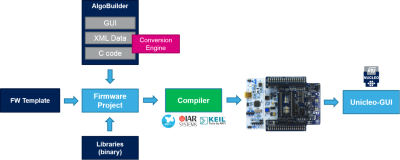STMicro Buys 32-Bit Embedded MCU Graphics Specialist

STMicro Buys 32-Bit Embedded MCU Graphics Specialis
LONDON — STMicroelectronics has acquired software specialist Draupner Graphics of Denmark, a developer and supplier of a software framework enabling graphics and animations for embedded graphical user interfaces (GUIs) on 32-bit embedded microcontroller units. Terms of the transaction were not disclosed.
Draupner Graphics’ TouchGFX technology is a software framework written in C++, enabling development of embedded GUIs with high-end graphics on energy-efficient hardware. It optimizes the utilization of small hardware platforms, such as the Arm Cortex M-range microcontrollers, resulting in fast image updates with low MCU load (typically less than 15%). Its designer tool features a drag-and-drop GUI builder to help developers and designers quickly create a fully functional prototype from early design sketches.
Hosted on 32-bit microcontrollers, its TouchGFX enables the standard of high-end graphics that one might typically expect in today’s smartphones to be delivered in other environments — such as in smart home and building automation systems, appliances, wearables, and audio and video systems. STMicroelectronics says that several of its STM32 product lines, based on the 32-bit Arm Cortex-M-core MCUs, already support TouchGFX.

Draupner Graphics TouchGFX enables embedded GUIs to be developed on 32-bit MCUs.
Source: STMicroelectronics
"We have been working closely with the team [at Draupner] for five years and regularly see the value TouchGFX is already delivering on STM32 MCUs in different consumer, appliances, industrial, and medical applications," said Daniel Colonna, microcontroller marketing director for STMicroelectronics, in a press statement. Colonna said the acquisition would accelerate both TouchGFX and STM32 roadmaps "to offer embedded developers and their customers more advanced features, raising the bar of human-machine interfaces across all of the devices that people interact with every day.”
Draupner Graphics was founded in 2014 as a spin-out of software design consultancy Mjølner Informatics in Denmark.
IoT sensor design with graphics, too
Making coding simple with GUIs seems to be getting more commonplace as designers move to higher levels of abstraction. In a separate announcement last month, STMicroelectronics released its AlgoBuilder tool, which takes the coding out of firmware development by letting users build IoT sensor-control algorithms graphically with library modules, ready to compile and run on an STM32 MCU.
Created for development of IoT devices containing ST’s MEMS sensors and MCUs, the company says that AlgoBuilder helps quickly get a proof-of-concept model up and running. Users can build their algorithms quickly and intuitively by dragging and dropping selected functions, connecting the blocks, and configuring properties. It validates all design rules and automatically generates C code based on the graphical design.
Featuring ST’s STM32 microcontrollers and MEMS sensors including motion and environmental sensors and silicon microphones, it provides libraries such as logic and mathematical operators, signal processing, user inputs, vector operations, and many others. Turnkey algorithms for commonly used functions such as sensor hub, motion-sensor calibration, activity recognition, motion intensity, and pedometer are included. Users can also add their own custom functions to the tool’s libraries.
It also provides an environment for connecting with other logic to create a complete firmware project ready to compile using an STM32 Integrated Development Environment (IDE) such as TrueSTUDIO for STM32, SW4STM32 System Workbench for STM32, IAR-EWARM IAR Embedded Workbench for Arm, and Keil µVision MDK-ARM-STM32.
AlgoBuilder can generate firmware for deployment on various STM32 platforms and allows users to test their firmware by launching the Unicleo-GUI application from within AlgoBuilder to display outputs from running firmware.
— Nitin Dahad is a European correspondent for EE Times.

Leave your comment
Note: HTML is not translated!